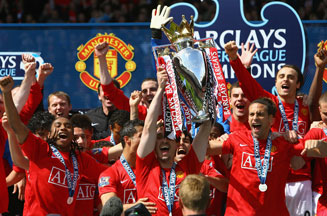
The only encounter many Brits will have had with the Entertainment Sports Programming Network (ESPN) is seeing it satirised in the block-buster US comedy film Dodgeball.
Now, however, the global sports network has the opportunity to become a household name in the UK after picking up Setanta's forfeited rights to the FA Premier League.
The Walt Disney-owned broad-caster has coveted a higher profile in the UK market for some time. It already has a presence on Sky through its ESPN America and ESPN Classic channels, with the latter already showing archived Premier League matches.
The Premiership rights deal significantly enhances its appeal. ESPN will broadcast 46 live games during the 2009-10 season, and 23 games each season from 2010-13.
Sports fans in the UK will now have a raft of questions for ESPN, mostly about how they can watch the matches it will be showing. Advertisers, meanwhile, will be scrutinising its distribution and revenue model. In its 30 years of broadcasting it has become a massive, global player, with 98m subscribers to its six US networks and 45 international networks.
The channel would do well, though, to take note of the circumstances leading to the demise of Setanta. Rather than strike a package deal on the Sky platform, the Irish broadcaster signed up customers directly through an independent contract. It collapsed under the weight of its £425m Premier League contract last week, prompting questions about its business model.
Nonetheless, Damion Potter, communications director at ESPN, describes winning the rights as a 'huge step' for the company's plans for UK expansion.
Indeed, Antony Markcou, managing director of sports marketing agency Sports Revolution, believes ESPN has a major advantage over Setanta. 'ESPN already has the rights to broadcast the UK Premier League across Asia, so it's not new to it,' he says. 'It is already doing it, and doing it well.'
When Setanta entered the UK market in 2007, according to one industry insider its investors wanted to build the company up quickly before selling it on at a profit. Arguably, this short-term view was its downfall, as it is believed there was not enough emphasis on building a strong brand.
Steve Booth, chief executive of Arena BLM, Setanta's media agency, claims this led to an unmanageable amount of subscriber turnover. 'A key factor was undoubtedly the massive churn in the subscriber base, which was three times that of Sky,' he says. 'Punters didn't have a reason to stick with [Setanta] after the footie season ended.'
Customer dissatisfaction with Setanta was well-documented. During an England vs Andorra match last year, the crowd was heard chanting 'We hate Setanta'. Despite the obvious frustrations expressed by customers, Setanta reportedly did not make customer service a priority.
ESPN is already taking a more considered approach to its Premier League coverage. It has not announced how it will package its channels in the UK, but they will be available through Sky subscription.
Sky will also sell ESPN's advertising space, which may work in its favour. Chris Locke, UK trading director at media agency Starcom, says: 'Sky is very experienced and wise about how to sell advertising around sports. It will be able to leverage more money as ESPN's sales house then Setanta was able to manage through IDS.'
Markcou suggests that Disney could potentially package ESPN with its other channels, thereby creating a family-led package to appeal to a wider audience.
Whatever approach ESPN takes in the UK market, its overriding advantage is its deep pockets. As one industry insider points out, creating a successful pay-TV platform takes 'time, patience and a willingness to make a loss before you make a profit'.
With Disney marshalling its defence, ESPN appears to be well-placed to put in a strong all-round performance.

